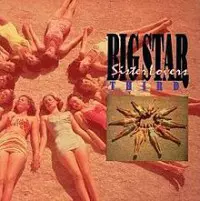If Big Star's second album, 1974's Radio City, was the sound of a band brilliantly, beautifully fracturing, whether from lack of commercial success or from personal issues,Third is that band's collective skull at last cracking and breaking apart into tiny pieces, scattering onto the floor. The songs are deeply disjointed, as if they were puzzles pieces haphazardly put back together and missing essential parts: "You Can't Have Me" and "Kizza Me" are desperate parodies of their previous power pop that was already maddening in the first place. But that's exactly what makes Third so brilliant, horrific and deeply moving; it's Alex Chilton giving into his eccentricity as a songwriter, eager to wreak havoc and spill his depression and bitter madness into chords and harmonies. Third is a prime example of discipline not always being a main feature of great music. Here the chaos and shredded songs make this one of the most unusual albums of the 20th century, if not ever.
Opener "Kizza Me" puts the listener right into the headspace of the record overall -- as said before, "Kizza Me" is like a nasty joke on power pop and Memphis soul, the saxophone honking much like a Bowie solo and the violin scoring isn't pleasurable at all, instead shrieking, giving urgency to the otherwise goofy lyrics "I want a white house, I want to feel you deep inside/Hey - kizza me! Hey why not, huh?" And even then Chilton and (brilliant) drummer Jody Stephens make the song feel tense, hilarious and deranged. The narrator of these songs is a man losing his sanity to depression, unable to hide his raw need for another person and his contempt for the things that make everyone but him so pleased and content. The languid, heat-stroked "Big Black Car" takes comfort in the shelter of the title object but then Chilton always has to get out of the car and face life over and over. The album is marked over and over by the contrast of the venomous, contemptuous sarcasm of, say "Thank You Friends" and "Jesus Christ" and the uncomfortable brutish need of "Take Care" and "Stroke It Noel." It's an album about yearning for love and companionship while being wary of the actual people themselves: "Take care not to hurt yourself/Beware of the need for help/You might need too much, and people are such."
I'll close however with the centerpiece of the album "Kangaroo," a masterpiece whose shudders and arching sprays of feedback as atmosphere predate shoegaze and noise rock. Off-beat drums sounding like sticks against pipes provide a sense of delicate imbalance, of things terribly wrong inside. Chilton's narrative again is in scraps, only the little details and primal feelings surging through his heart, everything reduced to sense memory: "I first saw you/You had on blue jeans/Your eyes couldn't hide anything/You was at the party/Thought you was a queen/Oh so flirty." It's a ballad of pure disassociated yearning, of a sickness and urgency that will not leave. Like the rest of the album, it's rock music as staggering id, emotional pain that bleeds into every corner of the sounds.
